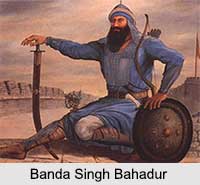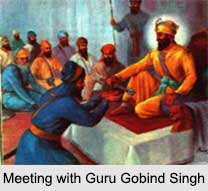 Banda Singh Bahadur, also known as Laxman Das, was a Sikh Military Commander. He fought against the Mughal Empire in the early 18th century. He was given the name "Banda Singh Bahadur" by Guru Gobind Singh. Banda Singh Bahadur had abolished the Zamindari System, and is also known for granting property rights to the tillers of the land.
Banda Singh Bahadur, also known as Laxman Das, was a Sikh Military Commander. He fought against the Mughal Empire in the early 18th century. He was given the name "Banda Singh Bahadur" by Guru Gobind Singh. Banda Singh Bahadur had abolished the Zamindari System, and is also known for granting property rights to the tillers of the land.
Early Life of Banda Singh Bahadur
Banda Singh Bahadur was born on 27 October 1670 in the house of Ramdev, an ordinary ploughman and a Rajput of the Bhardwaj at Rajouri in Poonch district of Jammu. He was then named as "Lachhman Das". During his adolescent age, he spent most of his time working in the fields. He was a great hunter and was proficient in the use of bow and arrow. Once while hunting, he shot a doe whose pitiable looks disturbed his mind. He was so much moved of this happening that he left hunting and became an ascetic.
He became follower of Sadhu Ram Das of Ram Thamman near Lahore (now in Pakistan). After some time he followed Janaki Das. His name was changed to "Madho Das". He journeyed from the north to the south for almost 20 years. It covered a period from 1688 to 1708. At the age of 21 years, he attained miraculous powers and reached Nander to set up his own Ashram.
Influence of Guru Govind Singh on Banda Singh Bahadur
 Guru Gobind Singh once went to Madho Das"s hermitage and sat on his magic couch. Madho Das who was out for some work came and tried all his occult powers to overturn the couch, but could not accomplish his goal. He fell at the Guru"s feet and sincerely apologized for the mistake. Thereafter he promised that henceforth he would serve the Guru as his slave (Banda). The Guru pleased with his humility pardoned him and appointed him for his work. He sent Banda to Punjab. Banda Singh was to be the secular leader of the Sikhs. The Guru also gave him five arrows from his quiver and 25 soldiers.
Guru Gobind Singh once went to Madho Das"s hermitage and sat on his magic couch. Madho Das who was out for some work came and tried all his occult powers to overturn the couch, but could not accomplish his goal. He fell at the Guru"s feet and sincerely apologized for the mistake. Thereafter he promised that henceforth he would serve the Guru as his slave (Banda). The Guru pleased with his humility pardoned him and appointed him for his work. He sent Banda to Punjab. Banda Singh was to be the secular leader of the Sikhs. The Guru also gave him five arrows from his quiver and 25 soldiers.
Conquests of Banda Singh Bahadur
Banda Bahadur with his meagre resource of men and materials fought numerous battles against the Mughal forces and emerged victorious. He made extensive use of several war strategies. It was the combined effect of the spirit of sacrifice in the Sikh volunteers and the war strategies of Banda Bahadur that made Sikhs win many battles. The Battle of Sirhind took place in May 12, 1710 A.D and Banda Bahadur`s army became victorious. The victorious Sikh army entered Sirhind on 24 May 1710. The Battle of Rahon was fought on 11 October 1710.
He got married to daughter of one of the hill chiefs and it was few years before Mughals could trace him down. He again started his campaigns against Mughals and came out of hills to the plains of Punjab. Banda Singh`s rule, though short lived, had a far-reaching impact on the history of the Punjab. They continuously fought with the Mughals but at the end they began running out of ammunition and food.
Death of Banda Singh Bahadur
On 17th December, 1715, Abdus Samad told that he would not allow any killing by his men, if Banda opened the gate to the fortress. When Banda ordered the gate be opened, the Mughals rushed in to spear or stab as many as 300 of the half-dead and helpless defenders. Banda Singh has imprisoned in an iron cage. He was tormented and then brutally killed on 9th June, 1716.









